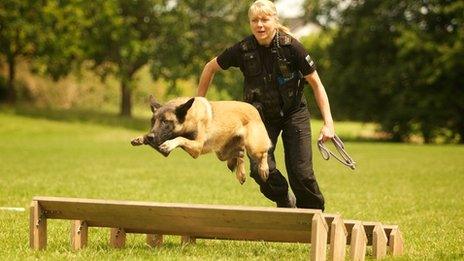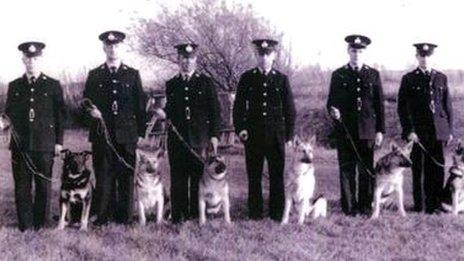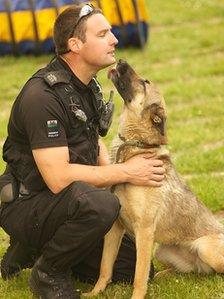South Wales Police dog school: Training the canine cops
- Published

Police dogs start their training aged about 18 months old, although they are taken on and exposed to experiences like crowded places as young puppies
With elections for Police and Crime Commissioners (PCCs) taking place on 15 November across Wales and England, we are taking a look at aspects of modern policing - including the role of the "canine cops".
They play a crucial part in the fight against terrorism around the world, their sensitive noses able to sniff out a "nanogramme" of explosives.
But the use of police dogs to crack complex crime is largely due to the "pioneering" work of South Wales Police and their battle to stop Welsh extremists in the late 1960s.
"South Wales Police were the first to train explosive search police dogs in 1969," said Sgt Ian Roderick, who has run the South Wales Police dog training school for 17 years.
"At the time there was a huge issue with Welsh extremism and there were attacks being carried out by the Free Wales Army.
"South Wales Police went to the Met [Police in London] and asked them to train the dogs to search for explosives. They said it couldn't be done - so we did it ourselves."
The results were "astounding" and led the way for the 380 explosive dogs that now work throughout the UK.
It also helped establish the South Wales Police school as one of the most prestigious in the UK, training dogs and officers from countries as far away as the the Middle East, Hong Kong and Bermuda.
It has also trained dogs for all four Welsh police forces, others around the UK, the Army and the Prison Service.
Around Wales there are now over 145 police dogs, who play an important support role for the police forces that will soon be overseen by the new Police and Crime Commissioners.
Christmas trees
The Bridgend-based dog school started off as a training ground for four German Shepherd puppies in August 1960 - Bruce, Bess, Cora and Carl - in the then Glamorgan Constabulary.
The first dog-assisted arrest in the force area came a few months later when Carl helped stop three men stealing Christmas trees in Tonyrefail.

Some of the first police dogs and handlers in the former Glamorgan Constabulary
Since then the dogs' skills have evolved to meet the demands of modern policing.
Now, along with patrol dogs, which are usually German or Belgian Shepherds, specialist search dogs - typically gun dog breeds - are trained to find substances that humans often cannot.
As well as explosives, South Wales Police have trained dogs to locate illegal drugs, firearms, currency, blood and bodies, passports and mobile phones and SIM cards.
Despite the complicated cases they become involved with, training the dogs is relatively simple, Sgt Roderick said.
"It's all based on positive rewards. We make it fun for them, we make it a game," he said.
"They look for something based on a certain smell and if they find it they get a toy or a reward after it."
He said the training could be adapted to find all manner of substances and that as new drugs and explosives emerge, the dogs can be shown how to find them.
"I still don't think we have exploited or understand more than 5% of what a dog is capable of," he said.
"Some of our dogs are capable of detecting nanogramme of substances. Scientists admit they can't recreate machines that can detect the same amount. It fascinates me even now.
"We train the dogs to meet the needs of society.
"The drug mephedrone - or meow meow as it's known - is a big thing now. It was something that was legal until a short time ago. That's what we're training the dogs to detect now.
"We have always got to react to what's going on out there."
Crowded stadiums

Police dogs live with their handlers and many remain with them on retirement
Puppies are usually taken on by the school when they are just a few months old and are helped to adjust to their new working environment, such as being taken to crowded stadiums and airports.
Then, when they are about 18 months old, they are given the training needed to gain their licence.
Sgt Maria Henry, who is in charge of Gwent Police's dog section, said on average their dogs were responsible for detaining over 100 criminals each month, along with recovering thousands of pounds of drugs and stolen property.
"The dogs are invaluable," she said.
"One recent success story was when a dog and its handler responded to a call-out about a stolen vehicle in Newport.
"The dog tracked some boys through fields and brambles and one of them was carrying a holdall with about a quarter of a million pounds worth of cocaine."
Usain Bolt
Police are not the only fans of their hero dogs.
"Some of the specialist dogs went up to the Olympics," said Sgt Henry.
"The explosives dog was searching the track area one evening after the crowds had gone home and he met Usain Bolt [Olympic 100m and 200m champion].
"Apparently he was fabulous with the dogs as he was missing his own. He asked if he could come and stroke them."
And what of the police handlers who form "extremely close" bonds with their dogs?
"All the dogs live with their handlers and they are very close as they have to trust each other," said Sgt Roderick.
"When the dogs retire, they often continue to live with the handler's family. You get protective of them. They're your partner."
- Published19 June 2012
- Published12 July 2012
- Published15 November 2011